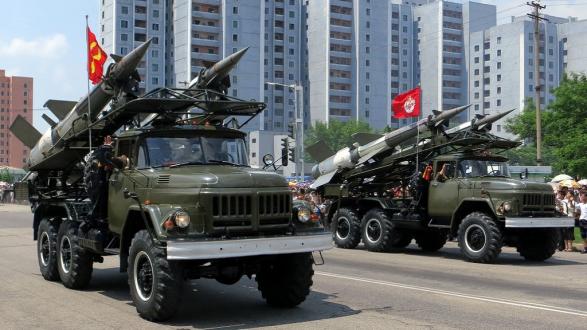In:
Global Beat is your weekly stop for news from around the world. Join us every Friday morning for important stories you should know about.
This week, North Korea successfully tests an intercontinental ballistic missile that is potentially capable of striking the United States; President Trump and President Putin hold their first face-to-face meeting at the G-20 Summit; the UN Security Council approves a major reduction of peacekeepers in Sudan’s Darfur region; and more.
____________________
Americas
A day after an assembly session to mark the country’s independence, Venezuela’s opposition-held National Assembly was stormed by a group of pro-government supporters, leaving several lawmakers who oppose Venezuelan President Nicolás Maduro injured. Reporters inside the building were also attacked and robbed of their equipment. Supporters of Maduro claim the opposition is seeking a violent coup backed by U.S. support. Maduro’s opponents are demanding general elections to end Maduro’s rule and ease the country’s devastating economic crisis. At least 90 people have been killed and hundreds have been injured in protests over the past three months.
Also check out:
- Former Guantánamo detainee to get $10 million from Canada – Steve Almasy, CNN
Central & South Asia
In a decision mediated by a U.S. delegation led by Senator John McCain, Pakistan and Afghanistan have agreed to conduct "coordinated, complementary" security operations against terrorist groups along the nearly 2,600 kilometer, largely porous border between the two countries known as the Durand Line. Both Pakistan and Afghanistan regularly accuse each other of not doing enough to stop terrorist infiltrations on their respective sides of the border, contributing to a deep mutual mistrust and strained bilateral relations between the two countries.
Also check out:
- Narendra Modi, in first Israel visit by an Indian prime minister, seeks to break barriers in trade and history – Isabel Kershner and Ellen Barry, The New York Times
China & East Asia
North Korea successfully launched an intercontinental ballistic missile on Tuesday that is potentially capable of striking Alaska, Hawaii, and the Pacific Northwest. The United States responded to the show of force by conducting a ballistic missile drill with South Korea in the Sea of Japan on Wednesday, and asking for an emergency meeting of the UN Security Council to discuss the issue. Sanctions are likely to be revisited, but the political process is slow and enforcement is at best a partial and therefore ineffectual approach. The United States and its allies are expected to push for tough measures at this week’s G20 summit, but will be hard pressed to secure the support of either China or Russia, both of which continue to call for restraint from all sides.
Also check out:
- EU strikes free trade deal with Japan – Jim Brunsden, Financial Times
Europe & Russia
U.S. President Donald Trump and Russian President Vladimir Putin held their first official face-to-face meeting today at the G-20 summit in Hamburg, Germany. The meeting was a public-facing bilateral meeting, rather than the originally planned informal pull-aside meeting. Just one day before the meeting, Putin criticized U.S. sanctions and trade protectionism in an op-ed in a German newspaper, in which he also expressed Russia's support for the Paris climate agreement.
Also check out:
- UK to temporarily waive immigration rules for those impacted by tower fire – Merrit Kennedy, NPR
Middle East & North Africa
Saudi Arabia, the United Arab Emirates, Egypt, and Bahrain have agreed to continue their diplomatic and economic boycott of Qatar after the Gulf nation responded negatively to the list of 13 demands issued by Saudi Arabia. The initial 10 day deadline to comply with demands was extended by 48 hours at the request of Kuwait, who is acting as a mediator in the dispute. Although no agreement was reached, the Saudi-led coalition held back from an immediate escalation of the dispute by declining to impose extra sanctions or expel Qatar from the six-member Gulf Cooperation Council. Meanwhile, a new report has been issued labeling Saudi Arabia as the chief foreign promoter of Islamist extremism in the UK.
Also check out:
- Tony Blair should be prosecuted over Iraq war, high court hears – Owen Bowcott, The Guardian
Southeast Asia & Oceania
Vietnam has begun drilling for oil in the South China Sea, a move that is expected to trigger an angry response from China. China claims almost all of the mineral rich South China Sea, including reefs and islands disputed by other nations. The South China Sea may hold 28 billion barrels of oil, according to an estimate from the U.S. Geological Survey from the mid-1990s. With technology improvements, this figure could have since increased substantially. The bold move appears to be the cause behind a senior Chinese official cutting short an official visit to Vietnam last month. The piece of seabed in question is known as Block 136-03 by Vietnam, but China calls it Wan-an Bei 21 and has leased out the same area to a different company.
Also check out:
- Cambodia shutters border with Thailand to curb illegal crossings – Hour Hum, Radio Free Asia
Sub-Saharan Africa
In a resolution unanimously adopted by the Security Council, the UN approved a major reduction of peacekeepers serving in Sudan’s troubled Darfur region. Over a third of the 19,000 peacekeeping troops and police officers deployed in Darfur will be withdrawn, a move that is part of a larger effort led by the Trump administration to reduce the UN peacekeeping budget. Although violence has subsided in some parts of Darfur, human rights groups warn of the heightened risk of abuses against civilians that would likely occur following the withdrawal of peacekeepers in the region. It is expected that the UN General Assembly will vote on a new peacekeeping budget on Friday.
Also check out:
- United States strikes al Shabaab militants in Somalia – Phil Stewart, Reuters




